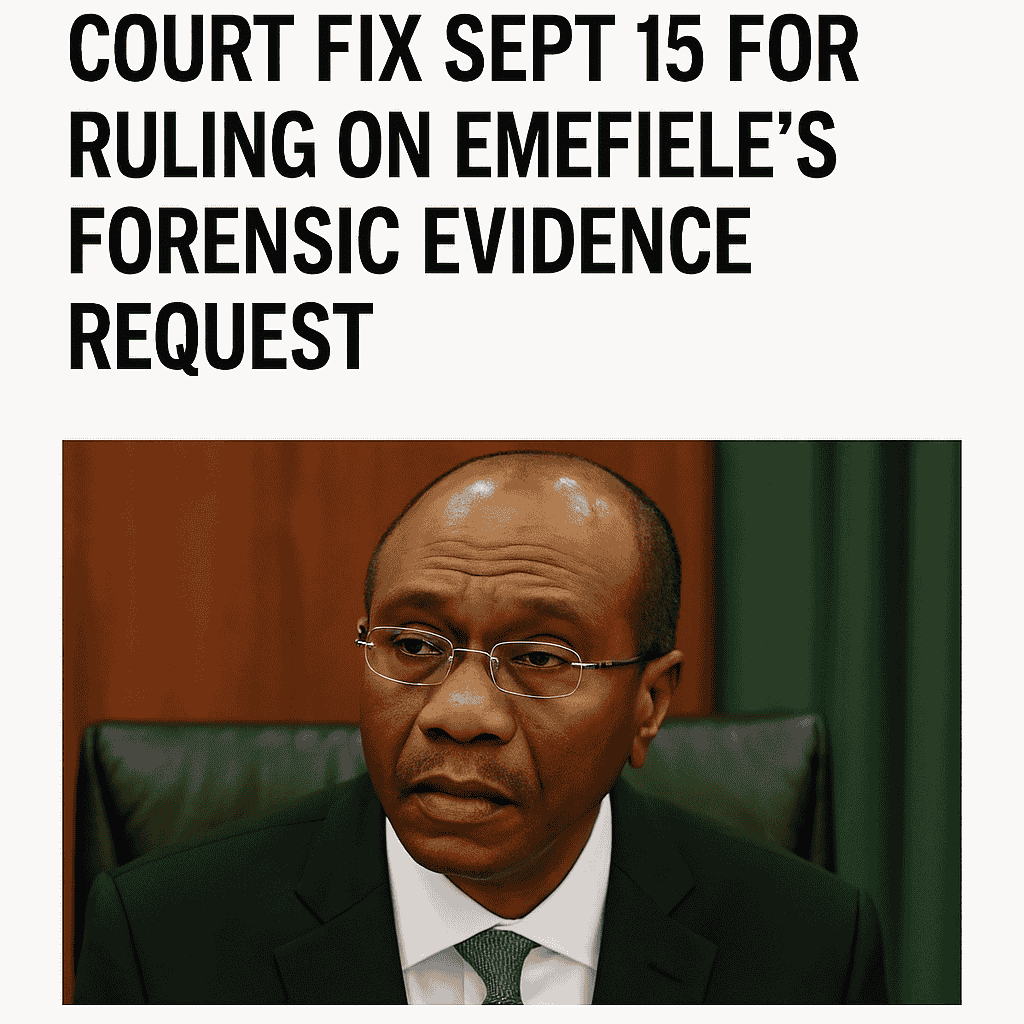
Alleged $4.5 Billion Fraud: Why Emefiele’s Forensic Evidence Request Could Shake Nigeria’s Judiciary
The case against former Central Bank of Nigeria (CBN) Governor, Godwin Emefiele, just took a dramatic turn. Accused of orchestrating an alleged $4.5 billion fraud, Emefiele is now pushing for a forensic audit to prove his innocence a move many say could expose rot not just within the apex bank, but in Nigeria’s elite financial and political circles.
On September 15, all eyes will be on the Federal High Court as it rules on his application to introduce forensic evidence. The stakes? Possibly the credibility of the anti-corruption war under President Bola Ahmed Tinubu’s administration and the legacy of Nigeria’s central banking system.
A Brief Recap: The Emefiele Saga
Godwin Emefiele served as Nigeria’s CBN governor from 2014 to 2023, surviving transitions from the Jonathan administration through Buhari’s two terms unusual for someone in such a politically charged position.
But his tenure, once praised for bold policies like the Anchor Borrowers Programme and currency interventions, came crashing down in 2023 when accusations of fraud, abuse of office, and economic sabotage began to surface.
The Economic and Financial Crimes Commission (EFCC) alleges that Emefiele approved fraudulent payments, mismanaged foreign reserves, and manipulated Nigeria’s exchange rate for personal gain. The total value? A staggering $4.5 billion and ₦2.8 billion.
The Game-Changer: Forensic Evidence Request
In a bold legal maneuver, Emefiele’s defense filed a motion requesting that independent forensic experts be allowed to review financial documents, transaction logs, and internal memos relevant to the case.
His argument? That the allegations are politically motivated, based on selective data, and that only a full forensic audit can expose the truth.
The prosecution, however, is pushing back hard. They claim this is a delay tactic meant to stall the trial and manipulate public perception.
So what happens if the court grants his request on September 15?
What’s at Stake?
1. The Integrity of the Anti-Corruption War
President Tinubu has promised Nigerians a renewed anti-corruption crusade. But critics argue that only low-hanging fruits like former appointees of the previous administration are being targeted.
If Emefiele’s forensic audit request reveals sloppy investigation or withheld evidence, it could expose the EFCC to public ridicule and weaken its prosecutorial authority.
2. A Test of Judicial Independence
The Nigerian judiciary has long been accused of being compromised. A ruling in favor of forensic scrutiny may restore some faith if it proves the courts can stand up to political pressure.
Conversely, a rejection of the motion without clear legal grounds may confirm what many already believe: that the courts are tools in a broader political game.
3. The Future of CBN and Financial Transparency
The CBN, a sacred institution in Nigeria’s economic architecture, now stands tarnished. This case is not just about Emefiele it’s about how billions were moved without accountability.
If forensic evidence reveals internal collusion, expect a massive shake-up of financial oversight bodies and a review of CBN’s operating laws.
The Political Undertones No One Is Talking About
Let’s not pretend this is a straightforward legal battle. Emefiele’s arrest came shortly after Tinubu assumed office—following months of tension over the Naira redesign policy, which many believe was engineered to frustrate Tinubu’s campaign financing.
Some analysts claim this case is payback, disguised as justice. Others insist it’s overdue reckoning for years of opaque financial dealings.
But make no mistake: whichever way the ruling swings on September 15, it will be political dynamite.
Nigerians React: Twitter on Fire
On social media, the court case is drawing divided opinions:
@NaijaWatch: “Forensic audit is the only way to end the lies. If EFCC is confident, they should allow it. Let’s see the truth.”
@RealConcernedCitizen: “Emefiele has played too many games with our economy. Let him face the music. No distractions.”
@LawTalkAfrica: “This case will define judicial accountability in Nigeria for the next decade. September 15 is judgement day for all of us.”
Conclusion: Truth or Tactics?
Whether Emefiele is guilty or not remains for the courts to decide. But what’s clear is that his legal team’s call for forensic review is not just about justice it’s a chess move with massive implications.
Will the court bow to pressure and quash the motion? Or will it open the books and let Nigerians see what truly went on behind the closed doors of their apex bank?
now that the Former CBN Governor, Godwin Emefiele, is battling allegations of a massive $4.5 billion fraud, and his legal team has requested a forensic audit of the financial evidence. A Federal High Court will rule on the request on September 15, a decision that could dramatically shift the course of the trial.
Emefiele claims the case is politically motivated and insists only independent forensic experts can expose the truth. Meanwhile, critics argue that the request is a delay tactic aimed at undermining the EFCC’s case.
The ruling could have far-reaching consequences not just for Emefiele’s fate but for the credibility of Nigeria’s judiciary, President Tinubu’s anti-corruption image, and the public’s trust in the CBN. As the court date nears, Nigerians remain divided, and political tensions continue to rise.
One thing is certain: On September 15, Nigeria will either witness a win for transparency or another staged spectacle in the name of justice.





